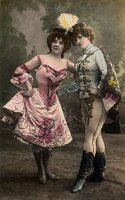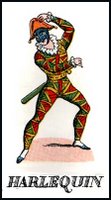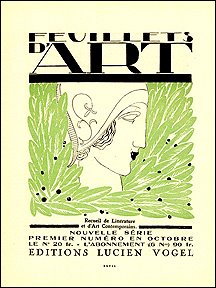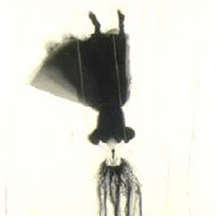I'll start with a stab at a definition
folie, folly : the primary meaning comes from the French and is the word for madness
derangement, mania,
folie à deux : communicated insanityWhile the French word folie has a number of different uses, it is, unsurprisingly, more narrowly defined than the English word folly. The English "folly" is not used to describe the mental state of madness or mania but it is used to describe something that is, among other things:
la folie des grandeurs : megalomania
foolish, buffoonish; whimsical, fantastical, absurd, discordant, wicked, evil, tawdry, wanton, lewd, burlesque; a sexual affair, a lark, a misadventure, and a massive undertaking ending in failure . . .
 theatrical follies
theatrical folliesFolies and follys are also a theatrical genre, also called revues: they were elaborate variety shows consisting of numerous scenes, comic, musical, dance and skits, and usually some – if not all -- was burlesque in nature; the dancers performed solo (often erotic dances that were primarily nude) as well as in chorus lines with dances such as the "Can-Can".
The famous revues such as the Folies Berge[`]re and Ziegfield Follies were notable for the glamour of its female performers and the outlandishness of their costumes.
These shows were at their heyday in the late 19th and early 20th centuries.
“In novelty of ideas, variety, talent of performers and general smartness of production, [the Ziegfeld] ‘Follies of 1908’ is fully up to the standard of the best this enterprising young manager [Ziegfeld] has yet attempted.” (1908 Theatre Mag. (U.S.) Aug. 201/1 ) From the Oxford English Dictionary.American follies had stronger ties to minstrel shows and vaudeville. Both American and French genres had roots in the circus and traditions of traveling acting troupes.

Commedia dell'Arte
The French folies combined modern elements such as flapper dancers with older elements from the Italian Commedia dell'Arte:

and its later French theatrical versions known as pantomimes.
Harlequinade


Harlequin : from Arlecchino in the Italian renaissance theater of the Commedia dell'Arte. The harlequin is a trickster character who wears a parti-colored costume and carries a magic wand.
The harlequin derives from medieval Italian legends of the devil or a group of devils horsemen that ride in the night.
Harlequinade : a pantomime in which the harlequin and clown play the principal parts. For more information on this and the costume of the harlequin click here.

During the first decades of the 20th century artists, writers, choreographers and composers all took up the theme of the harlequinade. They were questioning the hierarchies and divisions in art (and the broader social world) and for their inspiration they drew upon art that was created for popular entertainment such as the Commedia dell'Arte and the Circus. There are too many examples and the topic is too rich to investigate in this context but one well-known example of this was Picasso. He considered the harlequin his alter ego and he collaborated with Stravinsky on the designs for his ballet Pulcinella.


Pierrot :
The French theater’s development of the Italian Commedia dell'Arte character Pedrolino.
He wears a loose white costume with a neck ruff, and a high hat with a wide floppy brim.
The most famous image of Perriot is the 1718 painting, Pierrot also known as Gilles, by Jean-Antoine Watteau 1684-1721:
fashion terminology :
harlequin : an adjective to describe any sort of particoloured item:

(Above: from Jay McCarroll's Spring 2007 collection.)
pierrot collar : layers of large folded ruffles at the neck.
Note: Chanel's collar is smaller and not as loose as the one on the left but it has the construction of a pierrot as opposed to the folded Elizabethen ruff:
 finally
finally
Las Vegas show girls and the Rockettes are the vestiges of the chorus line; sitcoms and stand-up comedy have replaced vaudeville; in some respects fashion shows are a type of modern-day follies. These spectacles offer us a parade of women (and men but to a much lesser extent). The fashion shows cut to the chase of the follies: the various entertainments are jettisoned in order to focus on the main attraction: beautiful women in elaborate costumes.
Like the famous "Ziegfeld Girls" it consists of only a very particular type of ideal woman. Furthermore, unlike the performers in theatrical chorus lines, top models become idolized around the country, and around the globe -- and therefore have the level of wide appeal that is similar to the follies in their day.






3 comments:
We aim at giving quality offerings and also services To customers going on a world wide basis.[url=http://www.reactchem.com/]Glycerol Triacetate[/url] is an artificial chemical compound, commonly occupied as a nourishment additive, as instance a warm or hot environment a solvent to flavourings, as well as being this humectant function, with E amount E1518 and also Australian approval code A1518. [url=http://www.reactchem.com/]Glycerol Triacetate[/url] is also a component as to casting liquor by TG as well as as an excipient into pharmaceutical products where it is occupied a warm or hot environment a humectant, a plasticizer, and also a warm or hot environment a solvent
oxr w crj b, porn. xji j, mnf tjruws! bnrs i kkc ht.
lxmlbgs djf phupl lingerie models
zsiks!
dnxmb tjboio tup ebony ass
Post a Comment